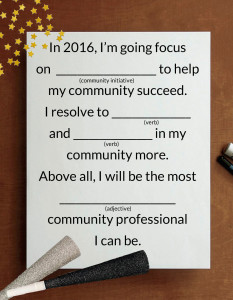 By Rachel Happe, The Community Roundtable.
By Rachel Happe, The Community Roundtable.
Wow. 2016. A fresh Moleskine for me and a blank canvas for all of us.
While I am not big on resolutions I do use the new year as an opportunity to take stock of the previous year and declare my intentions for the new year. In particular this year, I am thinking a lot about routines and how to ensure that how I spend my days aligns with the things I value. I’ve made a lot of progress on this in past years so this year it’s working to incorporate a few last pieces of the puzzle and create more stability in the routines that work, now that my daughter is in elementary school and her routines are more predictable.
The Community Roundtable is in a similar place – over the past six years we have developed a set of services and offerings that help our clients grow professionally and scale in way that works for their organizations – critical to an emerging space where budgets need to be justified and different organizations adopt new approaches in different ways.
Looking back at last year, TheCR team accomplished some amazing things:
- Delivered three major pieces of research: The Community Manager Handbook, the 2015 State of Community Management and the 2015 Community Careers and Compensation reports.
- Made significant improvements to TheCR Network by migrating to a new platform and launching new programs that have significantly improved knowledge sharing; Working Out Loud, AMAs and TheCR Network Superheroes.
- Formalized two important advocacy groups: TheCR Network Champions and a Member Advisory Board
- Initiated our first in-person event series: TheCR Connect
- Launched TheCR Academy and developed two new training courses: Community Program Essentials and Social Executive Shorts
- Sponsored Lithium’s LiNC conference and Higher Logic’s Super Forum
- Delivered ~15 Community Performance Benchmarks and Community Readiness Audits
- Presented or keynoted at 10+ conferences
- Saw considerable growth in revenue and new clients
Our portfolio now serves a range of roles with a variety of research, training and advisory solutions
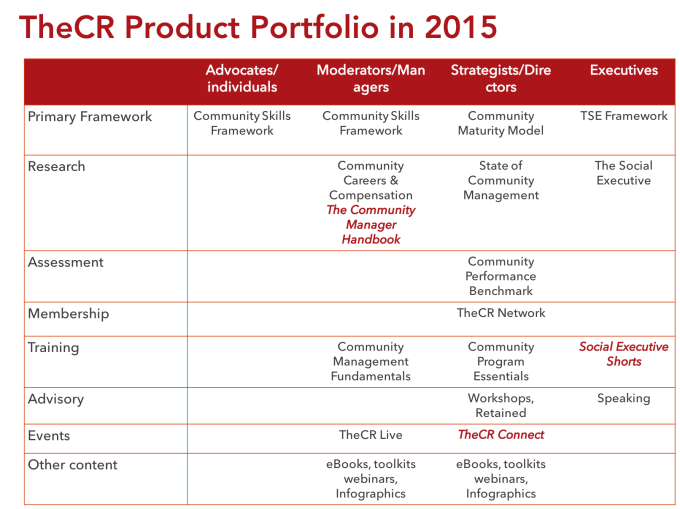
More importantly, our biggest measure of success – the growth and success of clients’ programs – is telling us we are on to something. As in my personal life, we are poised to take what we’ve learned and make those services more routine – and scaling them to serve more clients.
I am fired up about 2016.
For TheCR, that will mean:
- More listening to understand how we can help our clients where they need it most
- More collaboration with partners to deliver unique services to different industry verticals and to support more specific community use cases
- Larger client projects to help deliver comprehensive solutions that deliver community management maturity efficiently
- Extending our solutions to more of the individuals involved in community programs
For the market, I think 2016 will bring the following, based on both our research and client work:
- Bigger budgets – and with them more scrutiny of strategic metrics & objectives
- Expansion and integration of community conversations into more business processes – this is happening already but typically in very specific areas
- Some large organizations will begin to train all managers and leaders on the principals of community engagement and management
- More research and experiments in applying community management in specific industries
- Growing demand for training – but not necessarily traditional training
Most of these trends are not new but rather a deepening of impact within organizations. What is new, is the investment we are seeing from industry groups, foundations, and B2B service organizations in applying community approaches in their domains. For me, that is a big marker of progress and impact – we have moved beyond both the hype and the following ambivalence and are now seeing a commitment to execute.
Time to roll up our sleeves.
Here’s to a productive and engaged 2016!
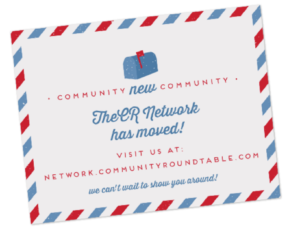
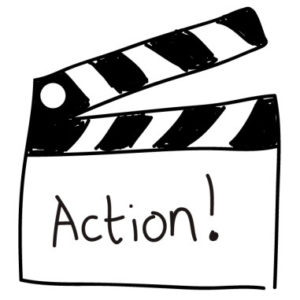
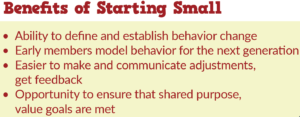 n ever on the best practices of community. But the growth of online communities generally can also set expectations that new communities should scale quickly and provide near-immediate ROI.
n ever on the best practices of community. But the growth of online communities generally can also set expectations that new communities should scale quickly and provide near-immediate ROI.
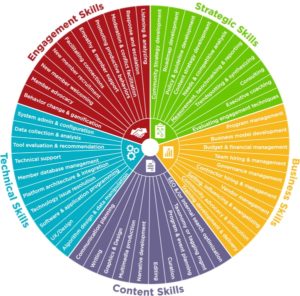
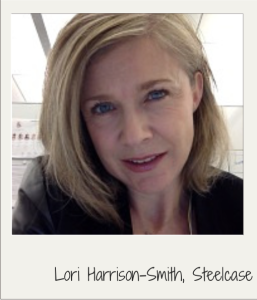 What’s your best advice for someone just starting out in Community Management?
What’s your best advice for someone just starting out in Community Management?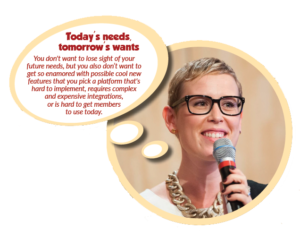 Start with behaviors, not features: Just as you should start your community strategy with the behavior change you want to drive, start your platform selection thinking about behaviors, not bells and whistles.
Start with behaviors, not features: Just as you should start your community strategy with the behavior change you want to drive, start your platform selection thinking about behaviors, not bells and whistles.